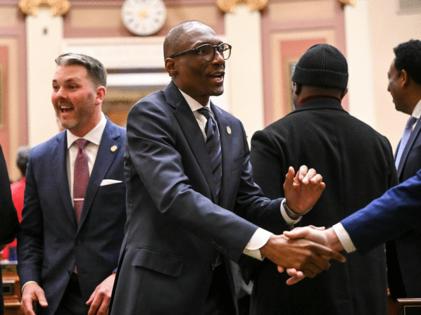Ethics panel deadlocks on complaint against Minnesota Senate president
Published in News & Features
MINNEAPOLIS — An ethics complaint Republicans filed against Minnesota Senate President Bobby Joe Champion, DFL-Minneapolis, stalled Monday after a legislative ethics panel failed to reach consensus on how to proceed.
The two Democratic-Farmer-Labor and two Republican members of the Senate Subcommittee on Ethics deadlocked on whether there was probable cause that Champion broke ethics rules when he helped obtain millions in state funding for a nonprofit whose founder he had done free legal work for.
They also tied in a 2-2 vote on a DFL-backed motion to dismiss the complaint. The lack of action comes after the subcommittee asked Champion to disclose any potential conflicts of interest at an April 24 meeting but made no other rulings.
Champion initially asked for an advisory opinion from the Senate Subcommittee on Ethics after his pro bono work for a Minneapolis violence prevention organization had come to light earlier in April. He temporarily stepped down as chair of the Ethics Subcommittee and Sen. Sandy Pappas, DFL-St. Paul, took over the position as the panel handled the matter.
Champion faced allegations about potential conflicts because he carried a 2023 bill that helped the Minneapolis violence prevention nonprofit 21 Days of Peace obtain $3 million in funding. In 2025, he sponsored another bill to help provide another $1 million.
Republicans in their complaint argued Champion’s pro bono work for the nonprofit’s founder, Rev. Jerry McAfee and his parent group, Salem, Inc., harmed public perception of the Senate by giving the impression of a conflict of interest.
“Due to the relationship Salem Inc. had with Sen. Champion, it is difficult for the public to have faith that the projects selected by the Legislature for public funds are being chosen based on merit,” said Sen. Michael Kreun, R-Blaine, who brought the complaint against Champion.
Champion has maintained that his pro bono work for McAfee ended in 2022 and did not coincide with his sponsorship of the bills. He and his lawyer also argued that his ties to the nonprofit do not violate Minnesota Senate ethics rules because there was no financial interest.
“I thank the members of the ethics subcommittee for their work. As I have maintained since the beginning of this discussion, I have followed the rules of the Senate,” Champion said in a statement. “I did not introduce or advocate for legislation on which I had a conflict of interest and I’m grateful that the subcommittee did not find probable cause.”
Minnesota’s ethics rules for legislators are not particularly expansive. Current law bans members from voting on matters that result in a direct financial gain for themselves or their business disproportionate to others in the same field.
Political observers and lawmakers of both parties have noted that Minnesota’s part-time “citizen legislature” naturally lends itself to members voting on issues directly related to their work and communities. Teachers, nurses and business owners often back or carry bills directly related to their lines of work.
Champion’s backers have argued that his work with nonprofits and religious leaders in his district is the mark of an effective state representative.
In response to DFLers’ unwillingness to join GOP members in backing the ethics complaint Monday, Kreun said it was “disappointing that partisanship won out.”
_____
©2025 MediaNews Group, Inc. Visit at twincities.com. Distributed by Tribune Content Agency, LLC.







Comments